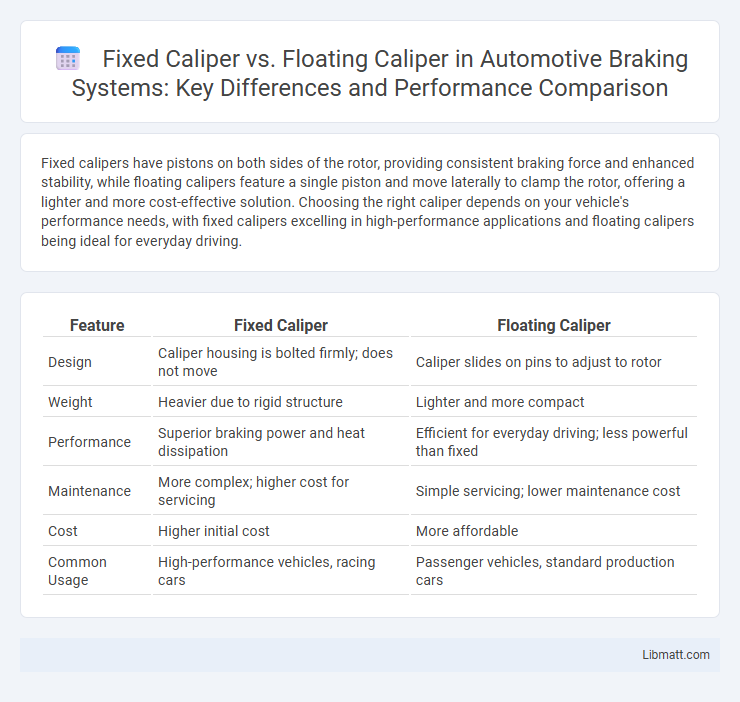Fixed calipers have pistons on both sides of the rotor, providing consistent braking force and enhanced stability, while floating calipers feature a single piston and move laterally to clamp the rotor, offering a lighter and more cost-effective solution. Choosing the right caliper depends on your vehicle's performance needs, with fixed calipers excelling in high-performance applications and floating calipers being ideal for everyday driving.
Table of Comparison
| Feature | Fixed Caliper | Floating Caliper |
|---|---|---|
| Design | Caliper housing is bolted firmly; does not move | Caliper slides on pins to adjust to rotor |
| Weight | Heavier due to rigid structure | Lighter and more compact |
| Performance | Superior braking power and heat dissipation | Efficient for everyday driving; less powerful than fixed |
| Maintenance | More complex; higher cost for servicing | Simple servicing; lower maintenance cost |
| Cost | Higher initial cost | More affordable |
| Common Usage | High-performance vehicles, racing cars | Passenger vehicles, standard production cars |
Introduction to Brake Calipers
Brake calipers are essential components of a vehicle's disc brake system, responsible for applying pressure to the brake pads and slowing the wheel's rotation. Fixed calipers have pistons on both sides of the rotor, offering better performance and more even pressure distribution, while floating calipers feature a single piston and slide on guide pins, making them lighter and more cost-effective. Understanding the differences helps you choose the right brake caliper for your vehicle's performance and maintenance needs.
What is a Fixed Caliper?
A Fixed Caliper is a brake mechanism where the caliper body is rigidly mounted, housing pistons on both sides of the rotor to apply clamping force evenly. This design enhances braking power and responsiveness by directly squeezing the brake pads against the rotor without any lateral movement. Your vehicle benefits from improved durability and consistent braking performance, especially under high-pressure conditions.
What is a Floating Caliper?
A floating caliper is a type of disc brake caliper that moves laterally relative to the rotor, allowing it to apply pressure to both sides of the brake disc by sliding on guide pins. This design enhances braking efficiency and reduces wear by evenly distributing the clamping force, making it commonly used in modern vehicles for improved stopping power. Floating calipers are generally lighter and cost-effective compared to fixed calipers, which have pistons on both sides and do not move laterally.
Design Differences: Fixed vs Floating Calipers
Fixed calipers feature pistons on both sides of the rotor, providing uniform pressure and consistent braking performance, while floating calipers have pistons only on one side and move laterally to clamp the rotor. The design difference impacts durability and maintenance, with fixed calipers being more robust and typically found in high-performance vehicles. Your choice depends on the driving conditions and braking needs, as fixed calipers offer superior stability and floating calipers provide cost-effective efficiency.
Performance Comparison
Fixed calipers provide superior braking performance due to their rigid structure, offering better pedal feel and more consistent stopping power in high-performance or heavy-duty applications. Floating calipers, while generally lighter and more cost-effective, may exhibit slight flex under heavy braking, resulting in less precise brake modulation and reduced performance during intense driving conditions. Your choice between fixed and floating calipers should consider the demands of your vehicle's use, prioritizing fixed calipers for maximum braking efficiency and floating calipers for everyday driving with moderate performance needs.
Maintenance and Durability
Fixed calipers offer superior durability due to their robust, single-piece construction, which reduces wear and requires less frequent maintenance compared to floating calipers. Floating calipers, while lighter and often easier to replace, demand more regular maintenance because their sliding mechanism can accumulate dirt and corrosion, leading to potential sticking or uneven pad wear. Selecting the right caliper type can extend Your vehicle's brake system lifespan and optimize maintenance intervals.
Cost Considerations
Fixed calipers generally cost more due to their complex design and higher-quality materials, offering superior braking performance and durability. Floating calipers, being simpler and lighter, provide a more budget-friendly option that suits standard driving needs without sacrificing safety. Your choice should balance initial expense against long-term maintenance and performance requirements.
Pros and Cons of Fixed Calipers
Fixed calipers offer superior braking power and consistent performance due to their rigid design, making them ideal for high-performance vehicles and heavy-duty applications. Their main drawback is higher cost and increased maintenance complexity compared to floating calipers, as well as greater weight that can affect overall vehicle dynamics. Your choice depends on prioritizing durability and stopping power over cost and ease of maintenance.
Pros and Cons of Floating Calipers
Floating calipers offer advantages such as lighter weight and reduced manufacturing costs due to their simpler design, which allows the caliper to slide laterally for even pad wear. However, floating calipers may suffer from decreased braking precision and potential sticking issues, as their sliding mechanism can accumulate debris or corrosion over time. Maintenance and reliability concerns make floating calipers less suitable for high-performance applications compared to fixed calipers.
Choosing the Right Caliper for Your Vehicle
Selecting the right caliper for your vehicle depends on factors such as driving conditions, vehicle type, and maintenance preferences. Fixed calipers offer superior stopping power and durability, making them ideal for high-performance or heavy-duty vehicles, while floating calipers provide cost-effective, lighter solutions suitable for everyday passenger cars. Understanding your vehicle's brake system specifications ensures optimal compatibility and safety when choosing between fixed and floating calipers.
Fixed Caliper vs Floating Caliper Infographic

 libmatt.com
libmatt.com